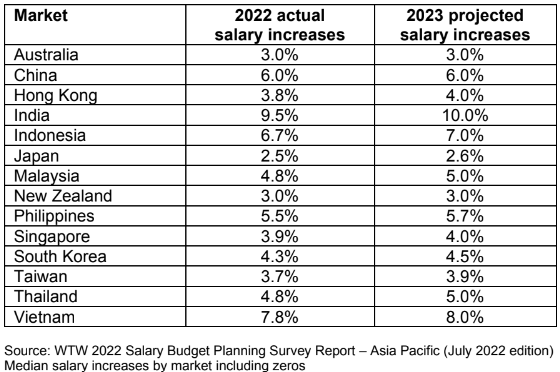Talent attraction, retention not major challenge for most employers in 2023: Survey

In the largest increase since 2020, companies in APAC are budgeting an overall median salary increase of 5.1% for 2023 across 14 markets, compared with the actual 4.9% increase in 2022, says global advisory, broking, and solutions company WTW’s Salary Budget Planning Report.
According to the report, more than half (56%) of employers in the region have budgeted for higher employee pay raises than last year, while one-third (33%) have increased their budgets since original projections were made earlier this year. Half of the companies (51%) are sticking with the pay budgets they set at the start of the year.
Some companies are also making more frequent salary increase adjustments. In markets such as Singapore, more than one-third (34%) have already increased or plan to increase how often they raise salaries. Among those respondents, the vast majority (95.5%) have or will adjust salaries twice per year.

Dynamic talent and compensation market trends reflect the dynamic business environment in APAC
Overall, the most cited reasons for organisations reporting higher 2022 actual salary budgets versus projections made last year were:
- Concerns over a tighter labour market (63%)
- Employee expectations for higher increases driven by inflation (40%)
- Anticipation of stronger financial results (31%).
“Compounding economic conditions and new ways of working are leading organisations to continually reassess their salary budgets to remain competitive. Although higher salary increases are expected, various industries are showing different developing rhythms. With such a dynamic environment, it’s imperative for organisations not only to have a clear compensation strategy but also a keen understanding and appreciation of the factors that influence compensation growth,” said Edward Hsu, business leader, Rewards Data Intelligence, International at WTW.
Companies take non-monetary actions for talent attraction, retention
According to the survey, attraction and retention challenges continue to plague organisations across the region, although fewer respondents expect those difficulties to be at the same level next year.
Over eight in 10 respondents (89%) are experiencing difficulties attracting talent this year, but only 39% expect difficulty in 2023. Similarly, 86% of companies reported difficulty retaining employees this year, but that number is expected to drop to just 54% next year.
Information technology skills are most sought after by companies. In Singapore, more than half (53%) of the organisations are looking to recruit digital talent in the next 12 months. Yet these professions are some of the most difficult to attract and retain, as three-quarters of companies experienced problems in attracting (75%) and retaining (70%) them.
In response to these issues, many organisations have taken or plan to take non-monetary actions to attract talent. For example, 67% of respondents have increased workplace flexibility, and 20% are planning or considering doing so in the next couple of years.
More than half of the respondents (58%) have placed a broader emphasis on diversity, equity and inclusion (DEI), and 24% are planning or considering doing so in the next few years. Additionally, 43% of companies continue to enhance recruitment offers with sign-on bonuses and equity/long-term incentive awards, while over 22% are planning or considering doing so in the next few years.
Employers take a reward approach to win talent war
Efforts to retain talent are also under way.
In Singapore, almost three-fifths (57%) of companies have broadened their emphasis on DEI to retain more talent, and 26% are planning or considering doing so. In addition, close to half (48%) have increased the flexibility for remote work, and 24% are planning or considering doing so in the future.
lmost 40% have changed their compensation programmes (e.g., base salary and short- and long-term incentive plans), and another 36% are planning or considering these. One-third (34%) have made changes to improve their employees’ experience and 47% are planning or considering doing so.
“With significant risks in the global economy, continued high inflation and employers grappling with talent supply challenges, organisations need to get more creative to address attraction and retention challenges. The workforce is composed of a diverse employee population, each with their own unique dynamics. Employers are challenged to meet their preferences and needs while delivering on a superior employee experience for all,” said Tan Yong Fei, Work & Rewards Leader, Singapore, WTW.
The survey, conducted in April and May 2022, received approximately 22,570 sets of responses from companies across 168 countries worldwide. In Asia Pacific, 6,945 organisations from 14 markets responded.
















